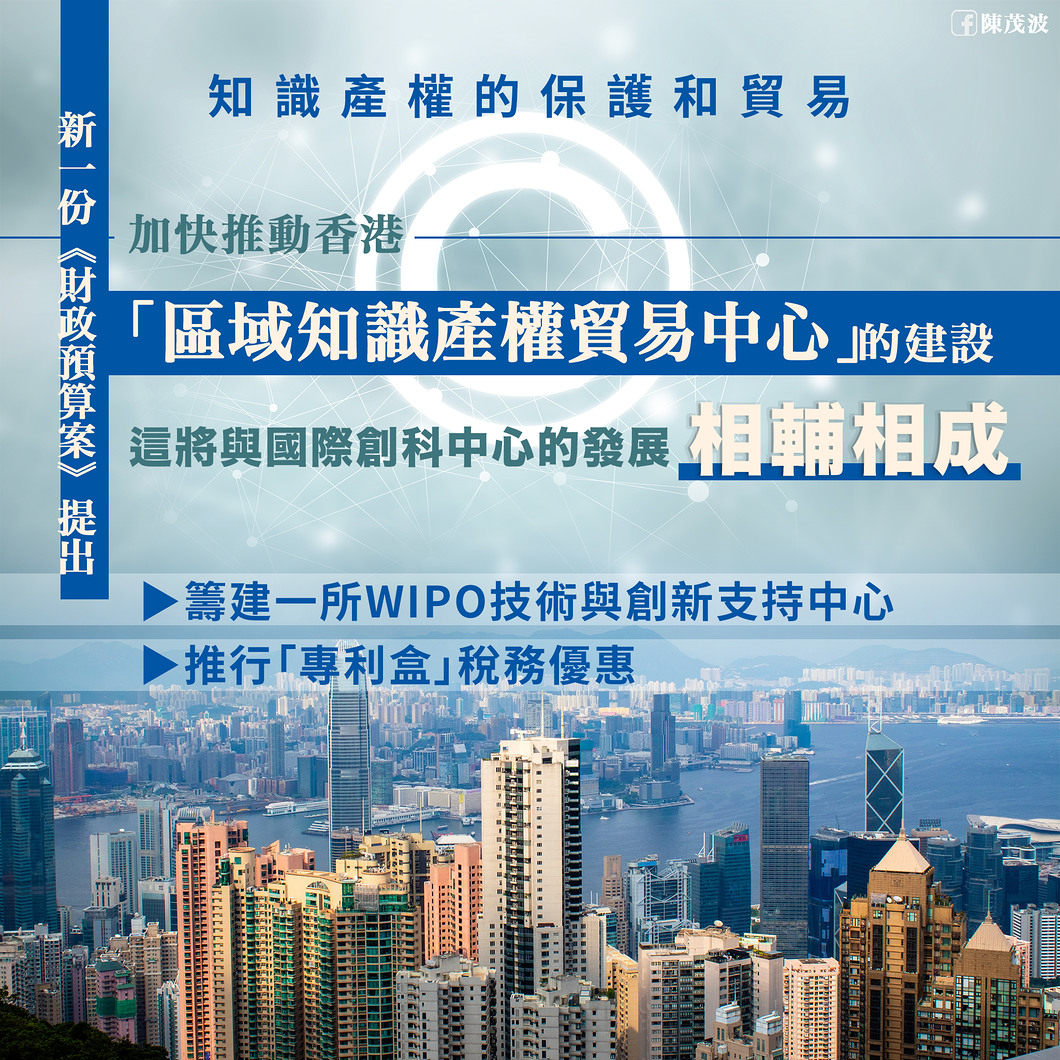Blog
Intellectual Property Protection and Trading
Our country is making great strides towards high-quality development. During this year’s “Two Sessions” in Beijing, President Xi Jinping underscored the importance of accelerating the development of “new quality productive forces” as a key component and pillar for high-quality development. Alongside developing Hong Kong into an international innovation and technology (I&T) centre, we will leverage Hong Kong’s robust intellectual property (IP) protection regime and realise our role as a regional IP trading centre under the National 14th Five-Year Plan, thus creating new pathways for development.
Amid fierce global competition in the I&T industry, advanced economies are focusing their attention on developing and making breakthroughs in cutting-edge technologies. Such endeavour requires substantial investments in capital and talent for basic research, commercialisation of outcomes, as well as innovation and application. Hence, a corresponding high level of legal protection for IP rights is indispensable to incentivising research and development (R&D) and application, and cultivating a favourable environment for I&T.

|
Indeed, the gravity of global IP activities has shifted towards Asia in recent years. By the end of last year, our country was home to nearly 5 million valid invention patents, topping the world. According to the “Global Innovation Index 2023” published by the World Intellectual Property Organization (WIPO), based on analysis of such factors as patent applications and scientific publications in the respective regions, the “Shenzhen-Hong Kong-Guangzhou” science and technology cluster has been the second most innovation-dense cluster globally for four consecutive years.
In Hong Kong, the Intellectual Property Department granted more than 10 000 standard patent registrations each year from 2021 to 2023, which represent an increase of more than 50% compared to the average annual number of registrations over the previous decade. This highlights the burgeoning upstream I&T ecosystem in Hong Kong and the substantial market potential for IP trading.
Many I&T companies we engaged have told us that a key factor for their decision to establish a foothold in Hong Kong is their confidence in the city’s legal system, rule of law, professional services, and robust IP rights protection, which would help safeguard their technologies and products as they expand their international business. These would facilitate the licensing of their technologies to other enterprises for developing new applications, and the generation of revenue via the “patent operation” model.
Strengthening and enhancing Hong Kong’s IP protection regime, as well as promoting IP management, commercialisation and trading, will enable Hong Kong to play to its strengths and thrive in the high-value segments of the entire I&T industry chain.
To expedite progress in this domain, I have introduced several measures in the recent Budget to accelerate the development of Hong Kong as a regional IP trading centre, which will complement the rise of the city as an international I&T centre.
To support scientific researchers in commercialising more technologies at different stages, we have also proposed in the Budget to establish a WIPO Technology and Innovation Support Centre (TISC) in Hong Kong. Upon commencing operation, TISC will provide local enterprises and entrepreneurs with high-quality patent-related information and services, and assist them in creating, protecting, managing and commercialising their IPs, thereby promoting IP trading.
In addition, we will also implement the “patent box” tax incentive to reduce the tax rate on qualifying profits generated from patents from 16.5% to 5%, encouraging respective industries to intensify R&D activities and create more IPs with market potential. This will accelerate our I&T development and IP trading activities. The relevant bill is scheduled for first reading at the Legislative Council this Wednesday. We are striving to complete the legislative work early.
On the other hand, strengthening IP protection and trading will also benefit the development of Hong Kong’s cultural and creative industries, and facilitate the building of the East-meets-West centre for international cultural exchange. The licensing business has emerged as one of the industries worth developing.
According to industry surveys, global retail sales of licensed goods and services exceeded US$340 billion in 2022, representing an increase of over 8% from the preceding year. The rising popularity of streaming platforms and e-commerce in recent years allow characters, brands, and trendy gadgets to be carried around the globe quickly through the Internet. In short, the potential for market growth is huge. In Hong Kong, the creative works of Mr Louis Cha (Jin Yong), a celebrated writer and a household name, are an exemplar of successful IP. His licensed dramas, video games and even toys and figures have enjoyed enduring popularity, and demonstrated substantial commercial promise.
As a matter of fact, Hong Kong stands as a major licensing hub in Asia. Many international licensors and licensing agents have chosen Hong Kong as their strategic base to expand their licensing ventures in the region. In 2022, the total values of IP use-related export and import reached $5.8 billion and $16.3 billion respectively, increasing by 3% and 9% as compared to those in 2017.
In addition to fostering the creation and trading of IPs in the creative industry through the “CreateSmart Initiative”, the Hong Kong Trade Development Council is actively optimising the “Asia Intellectual Property Exchange (AsiaIPEx)” platform by integrating pertinent creative content. This seeks to promote creative copyright trading and drive the commercialisation of literary and artistic works. A trial is targeted to be launched within this year. We will also explore further enhancements to the Copyright Ordinance to provide proper protection of copyright in light of the latest advancements in artificial intelligence. Consultation will be conducted within this year.
For collaboration with the Mainland, the Government is committed to maintaining close collaboration with the China National Intellectual Property Administration on various fronts, including strengthening training of patent examiners. We will also continue to promote exchanges and cooperation with sister cities in the Greater Bay Area (GBA), particularly Qianhai of Shenzhen, such as facilitating cross-boundary registrations and protection of IP rights, as well as promoting Hong Kong’s professional services to support enterprises in the GBA to engage in IP trading.
April 7, 2024










